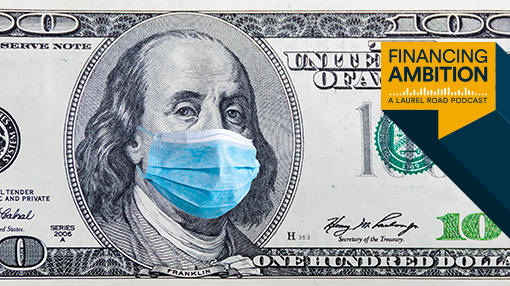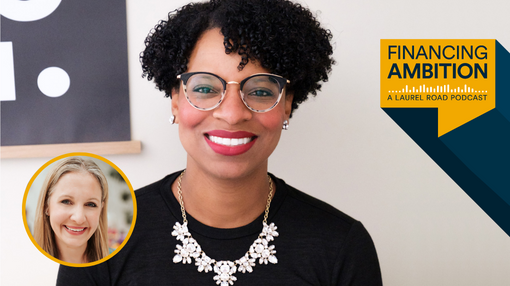Financial Advice for the Pandemic
Season 1, Episode 4 Listen to a discussion about what near-zero federal interest rates mean and how to stay financially...

Hosts:
Greg Fullum, Laurel Road Studio Director joined by Laurel Road’s Alex Lawrence and Briarley Laban
Guests:
Hannah Galin, Laurel Road Director, Pricing and Analytics, and Ken Raskin, Keybank SVP, Home Lending Sales Experience Owner
Season 1, Episode 4
Listen to a discussion about what near-zero federal interest rates mean and how to stay financially fit in these trying times.
Transcript
Greg [00:00:00] Hey, everyone, this is Greg Fullum, a producer of Financing Ambition. Normally, we’d be talking about personal finance topics, but since we’re in the middle of this coronavirus pandemic, we thought we’d switch it up a bit. We’re going to start covering topics like working from home, federal interest rate cuts, dealing with your personal finances during a pandemic, potential scams look out for. But before we get started, many of our customers here at Laurel Road are actually health care professionals, they’re doctors, they’re nurses, they’re physicians assistants, all working on the front lines battling this pandemic head-on. So we do want to give you a shout out. We want to thank you for your hard work and all this effort that you guys are putting in. We also thought it would be nice to to share some of your stories. So if you have a moment using the voice mail app on your iPhone or Android device, please make a short recording of what you’re going through and send it to [email protected]. We’re planning on hopefully sharing a few of these in an upcoming episode. Again, thank you, and we really look forward to hearing from you. Now, let’s get back to the regular podcast.
Alex [00:01:02] Hey, everyone, this is Alex.
Briarley [00:01:04] And I’m Briarley, and we want to welcome you to Financing Ambition, a Laurel Road podcast.
Alex [00:01:10] We’re joining you from, understandably, our very own homes. How’s it going for you, Briarley? How you feelin? Is Jarrod driving you nuts?
Briarley [00:01:20] Working from home is certainly a change. We live in a very small apartment in New York City, so we’ve had very cramped quarters lately.
Alex [00:01:31] We are in the exact same situation here, a bit further uptown from you. It’s been a truly adaptive process of figuring out how to make your own space work as an office. And oftentimes for Naomi and I, we have to change rooms to, you know, fix the noise levels. I’ll be on a call and she’ll be on a call. So there’s all sorts of balancing acts that I think a lot of us are having to reckon with. How is it for you?
Briarley [00:01:56] Yeah, so far, so good. We’re managing. We’re trying to keep perspective. We are healthy. We have what we need right now. So we are grateful to be in this position, to be able to work from home. So I would have to say the number one thing that keeps me sane is ensuring that we keep to our usual schedules. It’s been kind of what’s been keeping us moving. Keeping us afloat lately. How about you, Alex?
Alex [00:02:26] Yeah, very similar. I make sure that I wake up same time that I would wake up to go to the office more or less. And that sort of helps me get fired up. And then I do my normal routine. I’ve decided to not stay in my p.j.’s all day, as tempting as that is. And then I sort of sit down at the table, which is now my desk. I put my headphones on to tune out noise, as I would do at the office and write down what the day’s activities should be, what the day’s priorities are, and just try to focus as much as possible on maintaining my workflow normally. So I don’t know if you think it’s as positive as I do. But for me, I really have actually taken some good things away from this experience.
Briarley [00:03:03] I agree. And I’ve also seen some very, very funny memes and videos of people that have maybe had business at the top end and maybe pajamas down the bottom and being caught on video and that’s been keeping the day light.
Alex [00:03:18] Yeah. Who is that? When you sent me about couples leaving dirty water glasses around the house because I was like, boom. That is exactly me.
Briarley [00:03:28] Yes. So there’s an invisible coworker in our apartment. And this is actually taken from a meme that I saw called Cheryl. And Cheryl is the one that leaves the dirty dishes and cups around. So when you do see them, you can blame it on Cheryl and it will save anybody that you’re coworking with at this time.
Alex [00:03:50] Love it. So we have two guests today who are hopefully going to share some very useful advice for our listeners. We’d love to welcome our colleague, Hannah Galin. She’s the senior manager of Pricing and Strategy here at Laurel Road. Hannah, how is working from home going for you so far.
Hannah [00:04:07] It’s going OK. I think like many of us who are working in New York City are in rather small apartments, but we’re trying to do the best we can and been experimenting with cooking different things, tried making bread for the first time, so. OK.
Alex [00:04:21] Excellent. That also is a nice arm workout when you have to knead all the dough.
Hannah [00:04:24] Yeah, definitely.
Alex [00:04:26] So can you tell us a bit a bit more about your day to day role at Laurel Road? Just so people understand your expertise.
Hannah [00:04:32] So I spend my day focusing on what rates we are offering on our student loan products and looking at how applications are converting through the pipeline and at our competitive positioning. I also focus on our capital markets activities, in working to sell our loans to investors.
Alex [00:04:51] So Hannah, as many of us know, the Fed recently cut interest rates to nearly zero. Can you explain what that means for consumers and the private lending market?
Hannah [00:05:01] Sure. So when the Fed cuts rates to zero. A big disclaimer that that does not always translate into near-zero rates for lenders. The Fed is trying to target the rates that banks are lending to each other and in doing so, trying to encourage more lending and provide more liquidity in the market. However, banks are also trying to balance the needs of their own liquidity as they look at paying people who have savings accounts but also making out loans and other types of financing structures. And so, as you might see in your savings account, banks are probably paying a pretty low rate. I know I’m getting probably zero point zero one percent on my current savings account. But as far as lending rates, banks are also facing a lot of the same constrictions that a lot of businesses are as they lend to many businesses that are really struggling right now. And so because of that banks have to be very careful with the rates that they’re lending out at and many are factoring in a bit of a premium just given the liquidity crunch that they’re in.
Briarley [00:06:08] So we know that the interest rates are at a zero point, but can you share a bit more information on how the private leading market is responding to this as well?
Hannah [00:06:19] Sure. So a lot of private lenders who are not affiliated with banks are really struggling right now as a lot of them rely on either capital markets activity or loan sales or warehouse lines in order to fund themselves. They have to be able to sell loans in order to get the cash they need to originate new loans. And so in the student lending space, we’ve seen a fair number of our non-bank competitors have increased rates as they’re facing a higher cost of capital at Laurel Road. We’re fortunate to be part of a national bank KeyBank. And so unlike many of our non-bank competitors, we have access to a bank’s source of capital and source of funding, which is more stable in this current environment. And so because of that, we are able to continue to offer very competitive rates. And we’re continuing to work with our treasury group at Key to ensure stable funding.
Briarley [00:07:18] So with all that said, is now a good time for people to start thinking about refinancing or taking out new debt?
Hannah [00:07:26] As far as new debt, if people feel that their employment is stable and that they have a steady source of income, now could be a great time to be taking on a mortgage or other types of debt as lenders are offering great rates. As for refinancing, I think borrowers should take a look at what opportunities are out there within the student loan space for federal student loan borrowers. Some borrowers may be eligible for a payment holiday for six months under the New Cares Act. And so we encourage borrowers to consider whether this makes the most sense for them or whether they should lock in the opportunity to refinance with a private lender given where rates are today.
Briarley [00:08:08] Thank you so much. That information was extremely insightful.
Hannah [00:08:14] Happy to be here. Thank you.
Alex [00:08:17] So, Briarley, given this conversation we just had with Hannah and the tenuous economic environment we’re facing right now, we’re really lucky to have Ken Raskin from KeyBank with us as another guest today. Ken has decades of experience working with clients in retail banking. And we have no doubt that he’ll have some great advice to share. Ken, welcome. Could you tell us a little bit about yourself, your background and how you came to work at KeyBank?
Ken [00:08:40] Yeah. And thank you so much for having me. I think this is such an important time for us to be having conversations like what we’re going to talk about today. So I work at KeyBank on the Financial Wellness Review team, which is really focused around building software that is meant to enable bankers to have really advice centric and financial wellness-centric conversations.
Alex [00:08:58] And you mentioned in your introduction to me and your email that you help clients prepare for emergencies. Could you have ever foreseen the kind of emergency that we’re going through right now?
Ken [00:09:08] Certainly no one could have foreseen this. But when we think about an emergency and specifically a financial emergency at its core, that’s just something that is unexpected. I think what is most unique and kind of fascinating is that what COVID-19 is doing is we’re all going through a financial emergency at the same time, but preparing for an emergency, there’s nothing different about that when it comes to just sound traditional financial planning. You know, we’ve all heard financial experts talk about having three to six months of living expenses set aside for an emergency. But that word emergency means so many different things, right? An emergency might mean a tree falls on your house or you get flat tires. Those are not really the kind of emergencies we think about preparing for. It’s really about job loss. That is really kind of what that buffer is for. And I think now, more than ever, so many Americans are either experiencing that or run the risk of experiencing that.
Briarley [00:10:03] Totally agree with you and that’s some really good practical advice, certainly through these tough times. And many people are experiencing this right now. So can you share some tips that you have on how people can stay calm in the face of this pandemic and kind of help them deal with what could be coming up ahead as well?
Ken [00:10:24] So we talk about this idea of staying calm. I think it might be appropriate to actually take a step before that and say, what do we have to do to get to calm? I think a lot of us are not quite in that calm state yet. And I’d say step one is just starting to, I wouldn’t say accept but work towards acceptance that our core reality is just uncertain. And there are a lot of things outside of our control that’s going to cause financial anxiety. I would say that, you know, we think about what do we do as we kind of get to maybe the new normal. I think there’s some opportunities around prioritization of how we spend. There are so many things that we probably encounter on a day to day basis in our normal working lives. You know, going out for lunch, getting a haircut, going to the dry cleaners. Without those, there’s an opportunity for us to rethink about our spend. One thing I think is worth mentioning is not to move away from prioritizing our mental health. I would just encourage folks who are seeing therapists figure out a video chat way to do that. You know, make sure that we’re all eating right, getting sleep, you know, doing exercise. I think those are so important for putting us in a position to be able to make good financial choices.
Alex [00:11:35] Yeah, that makes complete sense. I’ve definitely been thinking about those things a lot. And we are all looking for ways to keep our life active and connected and social while still observing the measures that we need to observe to keep our communities safe. So I’m wondering, what do customers at key—what are you hearing from them these days?
Ken [00:11:57] I want to talk about this in a couple of different ways. The questions we’re getting today, I think these questions are going to evolve over time, but we’re certainly starting to see the concern. And so one of the things I just want to share here is many Americans have put the energy into building their emergency savings. There is a hesitancy about is it OK to tap that emergency savings? A lot of us feel like there’s an amount I like to see in my savings account. And so maybe I’m doing credit card spend instead of using that emergency savings. I just want to say this is an OK time to tap into that emergency savings. This is what you’ve planned for as long as we do it in a smart way. But to elaborate just on some of the things we’re hearing in our branches, partly about, you know, what they’re going through right now. And that means rent payments and mortgage payments and and various bills. And so one of the things that not just Key but many financial institutions are starting to do is to put together programs to really help out clients that are affected by COVID 19. They may already be eligible to defer payments of principal and interest for up to 90 days on things like mortgages, home equity products, student loans, auto loans, all kinds of different credit products. And none of those deferrals are going to have any impact on credit scores. Key, and I’m sure many other financial institutions are also launching temporary assistance loan programs at incredibly low interest rates. And again, even if you don’t bank with key, I’m sure your local financial institution is offering a similar option.
Alex [00:13:31] Great. Thanks for that info. Ken, I have to ask, you know, a lot of our listeners are of the Millennial and Generation Z cohort and some of them may have perhaps just invested for the first time. Can you speak to that person and just give them what you would say?
Ken [00:13:46] Yeah, absolutely. And it is certainly is a scary time, especially for newer investors. So some things to just remind ourselves about that we’ve learned from the past. In 2008, the market was down 37%. And that’s terrifying and scary. In 2009, the market was up 26.5%. Now we know what historical returns look like. The best thing to do is certainly is to be patient. I’d encourage folks to not be checking your 401K statement every day. But one of the things that I’m hearing from a lot of clients that I talk to is should I invest now? Is now a good time to invest? Everybody’s got to make that decision, obviously, for themselves. But just one caution that I want to put out there is it may be wise to keep a little bit deeper emergency savings than you normally would. So that three to six months that we talk about, we just don’t know how long this is going to go on. And so the temptations of possibly buying low. I don’t think those are as appealing as, you know, the reality of just needing to make sure we have a safety net. So just balance those things would be my advice.
Briarley [00:14:53] Yeah, great advice. And given our current situation, can you give us any tips on how people may be able to save money during this time?
Ken [00:15:03] Yeah, it’s a great question. I think about it in two ways. On the one hand, we have a totally different group of expenditures because we’re not leaving the house. So we can be a lot more thoughtful about what we’re spending money on. But on the other hand, for all of the terrible things that are going on, the economic climate, we’re also seeing interest rates at all time, historic lows. And so it’s worth taking a moment to say, is my mortgage, you know, should that be refinanced, should my student loans be refinanced? And I want to encourage a step beyond that. Let’s say you have $100 a month payment and that changes to $75 a month — with that extra $25 set up an automatic payment on the day that that bill comes out and move it immediately into a savings account. What we tend to do, even for those that are best at budgeting, we tend to spend what we have. So if we can set that money aside like it was never in our checking account and use it to build our savings, I think that’s really a pattern to success
Alex [00:16:01] That’s good advice.
Briarley [00:16:02] So Ken, Alex and I have just been discussing our work from home experiences. Wondering if you have any advice on how to manage your workload. Keep focused, stay sane given this current time.
Ken [00:16:18] It certainly is challenging. I think that the thing that I’ve most enjoyed and trying to adjust to the new norm is really having as many video conferences with my team as I can. One of the things I noticed early on is people felt really embarrassed or uncomfortable if their dog was barking when they were on a call or they were kids playing around. And we just kind of got to a point and said, you know what? Bring your pets. Bring your kids to the calls and introduce them. And then we started really having fun with it as a team. And it kind of turned into a Friday afternoon. You know, bring your kids to the call. And one of the warmest moments I’ve had in the last couple of weeks was just seeing my whole team’s kids on the video screens, looking at each other and waving at each other, which was great. So make it as normal as you can.
Alex [00:17:05] Yeah, I can say that that’s also been enjoyable for me. My girlfriend is a middle school teacher and I get to watch her with her kids every day teaching remotely through a digital classroom of 60 students. So it’s pretty funny. So everybody is approaching this in a novel way. People are having fun with it. I think, as you pointed out, having fun with it is really important in keeping that sense of community and closeness that we strive for. Ken, we really appreciate you being here.
Ken [00:17:30] Thanks for the invitation, guys. Really appreciate it.
Briarley [00:17:32] Thanks so much.
Alex [00:17:36] So en’s advice was really, really great. But one thing we didn’t mention was that during these times of uncertainty and vulnerability, financial scammers can become more active and it’s hard to spot them sometimes. But the old adage holds true if it seems too good to be true, it probably is.
Briarley [00:17:53] Yeah, this is a very sad but true reality that we’re seeing right now. Alex, are you able to see some examples of scams that you’ve been saying?
Alex [00:18:03] I know that people might run into a caller making claims and opportunities to invest their money, buy things for a bargain. Things that just seem like they can’t be real. Other banking scams where your bank account is attempted to be accessed or investment scams where they provide unrealistic investment opportunities that have high returns and no risk. Be on the lookout for these things during these times as they can become more prevalent.
Briarley [00:18:29] That actually reminds me of some advice that your father, William Lawrence, shared in Episode 1 about investment. And what rang true for me was that it’s really important not to react with emotion and slow and steady does when the race.
Alex [00:18:44] Definitely were in the process of planning some future episodes. That might be helpful if there’s something you’re concerned about personally, we would like to hear so please send us your ideas to [email protected].
Briarley [00:18:56] And before we go, we’d like to share some guidelines from the CDC to help slow the spread of the virus. Be sure to wash your hands often for at least 20 seconds and sterilize frequently contacted surfaces like doorknobs and countertops. The government is also asking everyone to practice social distancing and avoiding unnecessary travel and saying six feet apart whenever possible. Lastly, if you are sick, stay home. Follow the CDC website for the most up to date information. For information about how Laurel Road is addressing the Coronavirus, you can visit laurelroad.com/covid19.
Alex [00:19:34] Thank you all so much for joining us during these truly unprecedented times. Now for the legal. Any opinions, findings, and conclusions expressed in this podcast are those of the participant(s) and do not necessarily reflect the views of KeyBank. In providing this information, KeyBank is not acting as your agent or is offering any tax, financial, accounting, or legal advice. Laurel Road is a brand of KeyBank N.A., Member FDIC and Equal Housing Lender. NMLS #399797.
Don’t miss the latest financial resources.
This site is protected by reCAPTCHA and the Google Privacy Policy and Terms of Service apply.
Get tailored Laurel Road resources delivered to your inbox.
Search Results


